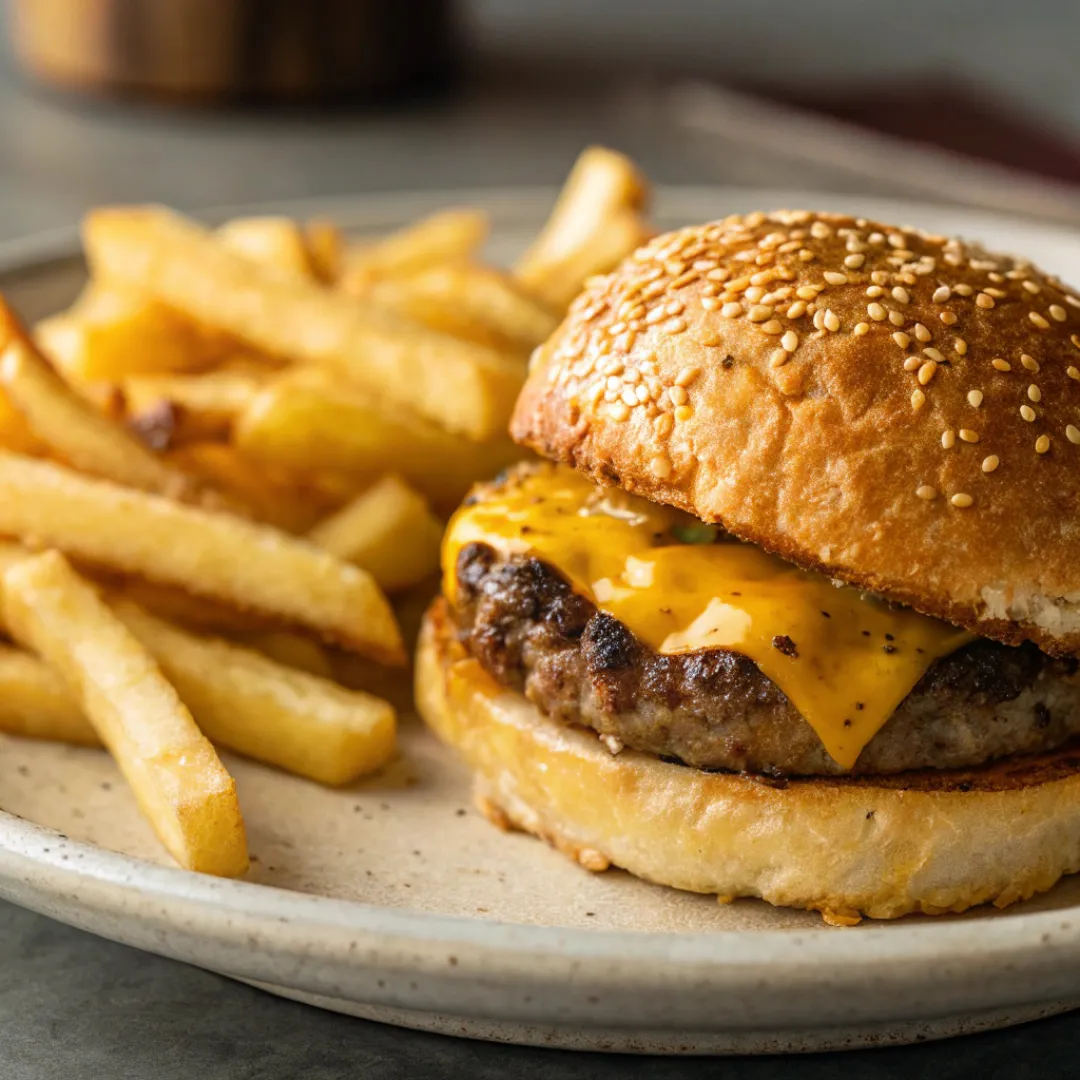Cheeseburgers and fries are a beloved food combination enjoyed around the world, but many people wonder: Is a cheeseburger and fries unhealthy? While these foods offer flavor and comfort, they also raise concerns about their nutritional impact. In this article, we’ll explore whether a cheeseburger and fries are truly unhealthy, examine their effects on health, and share tips on how to enjoy them in a more balanced way.
What Makes a Cheeseburger and Fries Potentially Unhealthy?
People often consider cheeseburgers and fries unhealthy due to their high calorie, fat, and sodium content. These foods, when eaten frequently and in large portions, can contribute to weight gain, high cholesterol, and other health issues. Here’s an overview of some key factors that give them their unhealthy reputation:
High Caloric Content
A typical cheeseburger with fries can contain 600 to 1,200 calories or more, depending on portion size and ingredients. This amount can take up a large portion of an adult’s daily calorie intake.
Saturated Fats
Cheeseburgers often contain high amounts of saturated fat in the beef patty and cheese, which can raise cholesterol levels.
Sodium Levels
Cheeseburgers and fries usually have high sodium content, especially when they include processed cheese, condiments, and salted fries. High sodium intake is linked to high blood pressure and heart disease.
Added Sugars
Some cheeseburgers contain added sugars in the burger bun, ketchup, and certain condiments. These sugars add extra calories and increase the glycemic load.
Nutritional Breakdown of a Cheeseburger
The nutritional value of a cheeseburger varies depending on its size and ingredients. Here’s a breakdown of a typical cheeseburger:
Calories
A standard cheeseburger can range from 300 to 600 calories or more, depending on toppings and size.
Protein
Cheeseburgers contain protein from the beef patty, typically around 20-30 grams. Protein is essential for muscle repair and energy but should be consumed in moderation.
Fats
A cheeseburger usually contains 10-20 grams of fat, of which 4-10 grams are saturated fat. Reducing saturated fats is essential for heart health.
Carbohydrates
The bun contributes around 30-40 grams of carbohydrates, depending on its size and type. This can impact blood sugar levels, especially with refined buns.
Sodium
A cheeseburger may have 500-1,000 mg of sodium, which is a significant portion of the daily recommended intake of 2,300 mg.
While cheeseburgers provide protein and other nutrients, their high levels of fat, sodium, and calories make them easy to over-consume and challenging to fit into a balanced diet without modification.
Nutritional Breakdown of French Fries
French fries are often considered a guilty pleasure. Let’s look at what makes them less healthy:
Calories
A medium portion of fries contains roughly 300-400 calories.
Carbohydrates
Fries are mainly made up of carbohydrates, about 40-50 grams per serving, which can spike blood sugar levels.
Fats
Traditional fries are deep-fried in oil, adding about 15-20 grams of fat per serving. This can contribute to excess calorie intake and elevated cholesterol.
Sodium
A medium-sized serving of fries contains 300-500 mg of sodium, adding to daily sodium intake. Excess salt intake can raise blood pressure over time.
Fries provide carbohydrates and small amounts of fiber from potatoes but are calorie-dense and can be difficult to eat in moderation, especially when served in large portions.
Impact of Cheeseburgers and Fries on Health
While an occasional cheeseburger and fries won’t have a long-lasting effect on health, regular consumption can lead to health concerns. Here’s a look at some of the potential impacts:
Weight Gain
Due to their high-calorie content, cheeseburgers and fries can contribute to weight gain if consumed frequently.
Increased Cholesterol Levels
The saturated fat in burgers and fries can raise LDL cholesterol, leading to an increased risk of heart disease.
High Blood Pressure
Sodium from the burger, cheese, fries, and condiments can lead to high blood pressure over time, especially in those with salt sensitivity.
Blood Sugar Spikes
Refined carbs in the bun and fries can raise blood sugar levels quickly, which is particularly concerning for people with diabetes or insulin resistance.
Healthier Ways to Make a Cheeseburger
There are several ways to make cheeseburgers healthier without sacrificing taste. Here are some tips:
Use Leaner Meat
Opt for a lean ground beef blend (such as 90% lean) or consider alternatives like ground turkey or chicken.
Choose Whole-Grain Buns
Whole-grain buns provide more fiber and nutrients, helping to balance blood sugar.
Load Up on Veggies
Add lettuce, tomatoes, onions, and other fresh vegetables for added nutrients and fiber.
Use Lighter Cheese
Choose a single slice of cheese, or try reduced-fat versions to cut down on saturated fat.
By making small adjustments, you can enjoy a healthier version of a cheeseburger that is still satisfying.
Healthier Ways to Prepare Fries
Making fries healthier is possible with a few simple adjustments:
Bake or Air-Fry Instead of Deep-Frying
Baking or air-frying fries cuts down on oil, significantly reducing fat content. For a delicious twist, try making herb-garlic baked fries to add flavor without extra calories. You can check out this recipe for The Best Baked Herb Garlic Fries Ever for a healthier, flavorful option.

Use Sweet Potatoes
Sweet potato fries offer a similar texture but with more fiber and vitamins, making them a nutrient-rich alternative.
Season with Herbs Instead of Salt
Try adding spices like paprika, garlic powder, and black pepper for added flavor without excess sodium.
These small changes can make fries a more balanced, delicious side to your cheeseburger.
Balancing Cheeseburgers and Fries in a Diet
Balancing indulgent meals like cheeseburgers and fries with a healthy lifestyle is key to enjoying them without negative health effects. Here are some tips:
Practice Portion Control
Opt for a smaller cheeseburger and fries, or consider splitting a meal to reduce portion sizes.
Pair with a Side Salad
Adding a salad can increase fiber and nutrient intake, helping to balance the meal.
Limit Frequency
Enjoy cheeseburgers and fries as an occasional treat rather than a regular meal.
Comparing Fast Food vs. Homemade Cheeseburgers and Fries
Homemade cheeseburgers and fries offer a significantly healthier option than fast food versions, primarily because you have full control over the ingredients and cooking methods. Fast food cheeseburgers and fries are often cooked with large amounts of oil to achieve a crispy texture and rich flavor. However, this high level of oil contributes to increased fat and calorie content. Additionally, fast food often contains added preservatives and artificial flavors to enhance taste and shelf life, which can add to sodium and sugar levels, impacting health when consumed frequently.
In contrast, making cheeseburgers and fries at home allows you to take a more mindful approach. You can choose leaner cuts of meat, such as ground turkey or low-fat beef, to reduce saturated fat content. Homemade fries can be baked or air-fried instead of deep-fried, significantly reducing the oil used without sacrificing the satisfying crunch. Additionally, you can select healthier options for buns, like whole-grain or sprouted bread, which add fiber and nutrients.
Homemade preparation also enables portion control, letting you create a balanced meal that doesn’t overdo the serving sizes often seen in fast food. You can top your burger with fresh vegetables, like lettuce, tomatoes, and onions, or even nutrient-rich additions like avocado or spinach. For seasoning, you can use fresh herbs and spices, reducing the need for excessive salt.
Ultimately, choosing homemade cheeseburgers and fries provides a way to enjoy this classic comfort food while aligning with health goals, allowing you to balance flavor with nutrition.
Are There Any Benefits to Cheeseburgers and Fries?
While they are often seen as unhealthy, cheeseburgers and fries can offer some nutritional benefits:
Protein
The beef patty provides protein, which is essential for muscle repair and energy.
Iron and Zinc
Red meat is a good source of iron and zinc, important for immune function and oxygen transport.
Fiber (with Whole-Grain Buns and Vegetables)
Adding whole grains and vegetables can increase fiber intake, supporting digestive health.
When enjoyed in moderation and made with wholesome ingredients, cheeseburgers and fries can be a delicious, occasional part of a balanced diet.

Frequently Asked Questions
How can I make a cheeseburger healthier?
To make a healthier cheeseburger, try using lean ground beef or a lean protein alternative, whole-grain buns, and lots of fresh vegetables. Limiting the amount of cheese and choosing lower-sodium condiments can also reduce calories and sodium.
Are homemade fries better than fast food fries?
Yes, homemade fries allow you to control the ingredients and cooking method, reducing unhealthy fats and sodium. Baking or air-frying fries with minimal oil and seasoning them with herbs instead of salt can make them a healthier alternative.
Can I eat cheeseburgers and fries on a diet?
Cheeseburgers and fries can fit into a balanced diet if enjoyed in moderation. Choosing smaller portions, healthier ingredients, and pairing them with fresh vegetables or a side salad helps make them more diet-friendly.
Are there any benefits to eating cheeseburgers?
Cheeseburgers provide protein, iron, and essential vitamins. When balanced with whole grains, vegetables, and moderate cheese, a burger can offer nutritional benefits, especially when made with wholesome ingredients.
Conclusion
Although people don’t typically consider cheeseburgers and fries healthy, you don’t have to cut them out entirely. By understanding their nutritional profile and making mindful choices in ingredient selection and preparation methods, you can enjoy this classic meal in a healthier way. Opt for leaner meats, whole-grain buns, baked or air-fried fries, and plenty of fresh vegetables to transform cheeseburgers and fries into a more balanced dish. Remember, the key to maintaining a healthy diet is balance, moderation, and mindful eating. So next time you’re craving a cheeseburger and fries, consider trying some of these tips for a satisfying, healthier version.
Note: This article provides general nutritional information and is not intended as medical advice. The nutritional details shared here are approximate and may vary based on individual ingredients and preparation methods. For personalized dietary guidance, please consult a healthcare or nutrition professional.

